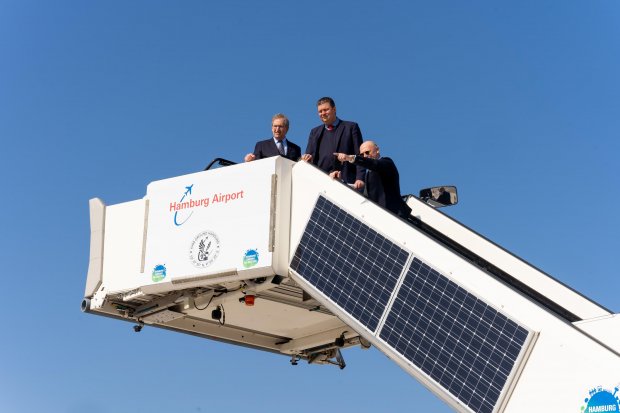Hamburg Airport the first CO2-neutral airport in Germany

Hamburg Airport is the first major commercial airport in Germany to achieve CO2-neutral operations. Hamburg Airport has thus satisfied the strict demands of Airports Council International Europe (ACI) for certification of CO2 neutrality. Northern Germany’s biggest airport is building on its role as a pioneer in climate protection. The building blocks of CO2-neutral airport operations are: reduced energy consumption, innovative technologies, conservation projects, and high quality offset certificates.
In the presence of Hamburg’s Finance Minister, Senator Dr Andreas Dressel, and the Economic Affairs Minister, Senator Michael Westhagemann, the expert assessor’s verification of achieving CO2 neutrality according to Airport Carbon Accreditation guidelines was issued to Michael Eggenschwiler, CEO of Hamburg Airport, today. Numerous internal measures and woodland projects made this achievement possible. Hamburg Airport is continuously optimising its technical building infrastructure, for example with efficient ventilation and air-conditioning facilities, the expansion of the site heating network, and the conversion to LED lighting, which saves emissions through significant reductions in energy consumption in the terminals and on the operational areas.
A thermolabyrinth provides environmentally friendly climate control in the terminals. At a depth of around 11 meters, air from outside is pre-heated or pre-cooled by natural means before being fed into the air conditioning systems in the terminals. Hamburg Airport meets around 70 percent of its heating energy requirements with its own block-type thermal power station. This highly efficient installation is powered by natural gas. The supplemental green electricity bought in is from 100 percent verifiable CO2-neutral generation.
Not one drop of fossil diesel fuel in more than five years
The apron vehicle fleet has been almost completely converted to alternative powertrains and fuels. At Hamburg Airport, airstairs run on solar power, towing vehicles on natural gas (and in the future on hydrogen), and cars on electricity. The airport has operated without fossil-derived diesel for more than five years now. Since the end of 2016, all diesel-powered vehicles at Hamburg Airport use a synthetic, zero-emissions fuel. Hamburg was the first international airport in the world to make this switch. The airport is currently planting an additional 50 hectares of new woodland at its 750-hectare forest site in Kaltenkirchen.
Goal: The Airport aims to go without CO2 emissions entirely
Since 2009, Hamburg Airport has reduced its annual CO2 emissions by almost 80 percent, from 40,000 to 8,700 tonnes. In order to fully compensate for the remaining CO2 emissions, Hamburg Airport currently has to invest in high quality offset certificates. With these certificates, in collaboration with FirstClimate, ecological projects are supported to verifiably reduce CO2 emissions within the global cycle. by achieving further CO2 reductions through our own actions, the proportion of offset certificates purchased will be reduced step by step. The long-term goal is to completely eliminate carbon dioxide emissions.
Michael Eggenschwiler, Chief Executive Officer of Hamburg Airport:
“Despite the economic difficulties arising from the coronavirus pandemic, we have pursued our climate protection goals as a top priority. We are thrilled to be the first major airport in Germany to achieve CO2 neutrality. Today, we are reaping the rewards of the innovative environmental work that our committed team has undertaken over more than three decades. We would never have achieved CO2 neutrality so soon had we not started working consistently towards that goal more than ten years ago. As a municipal corporation, we are leading by example and making our contribution to achieving Hamburg’s climate protection targets.”
Senator Dr Andreas Dressel, Minister of Finance, Free and Hanseatic City of Hamburg:
“Our Hamburg Airport is taking huge strides in climate protection and is nationally at the forefront in this area. And within Hamburg’s public sector, too, the airport operating company, with the City Government as majority shareholder, is setting the pace. Ultimately, we want all our publicly owned companies to achieve climate neutral balance sheets within the coming two decades at the latest. Energy transition and climate protection together constitute a fundamental focus and a shared compass guiding all our public companies. And this is even more the case than ever in view of the coronavirus crisis and the Ukraine war!”
Senator Michael Westhagemann, Minister of Economic Affairs and Innovation, Free and Hanseatic City of Hamburg
“As one of the largest centres of the global aviation sector, Hamburg has a special responsibility. The goal is to transform air traffic into a quiet, CO2-free means of transportation. The crisis has presented us with an opportunity to push ahead with this process on all levels, supporting it with appropriate programmes. Hamburg Airport is very consistently proceeding along this path. Now, as the next stage along this journey, the airport is aiming for completely carbon emission-free operations by 2035. I am convinced that this goal will be achieved.”
